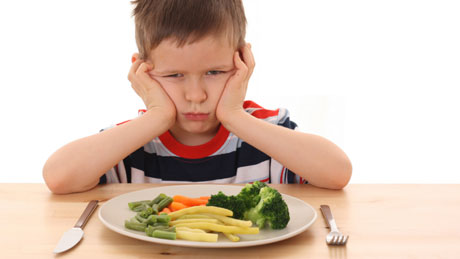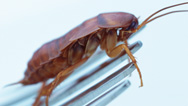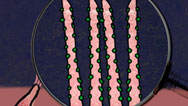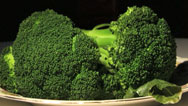
The Science of Picky Eaters
Don't like broccoli? Your DNA may explain why, because your sense of taste is largely encoded in your genes. Airing July 21, 2009 at 9 pm on PBS Aired July 21, 2009 on PBS

Program Description
Transcript
The Science of Picky Eaters
PBS Airdate: July 21, 2009
NEIL DeGRASSE TYSON: Hello, I'm Neil deGrasse Tyson, your host for NOVA scienceNOW.
Can you imagine sitting down for a meal and getting served something that you know will taste so bitter, so vile, but it's really good for you and you have no choice but to eat it?
Thank you.
For some people out there this is just what it's like to eat foods that most others find delicious. Why do people have such different reactions to the same thing? Well, as I found out, the answer may just lie in their genes.
Nasty.
Some kids love to eat, they'll eat almost anything. But others just hate the foods that are best for them.
BOY: I don't like that green stuff. I don't want it.
NEIL DeGRASSE TYSON: Some kids are picky eaters.
NEIL DeGRASSE TYSON: According to my mom, I was never one of them.
SUNCHITA TYSON: Ever since he was a little toddler, he ate everything that was put in front of him.
NEIL DeGRASSE TYSON: And it's a good thing I did.
SUNCHITA TYSON: There was no question about being picky. I didn't even know what the word meant.
NEIL DeGRASSE TYSON: So why are some people picky and others not?
DANIELLE R. REED (Monell Chemical Senses Center): Just like we all differ in our ability to see and to hear, people differ in their ability to taste.
NEIL DeGRASSE TYSON: What makes a dish taste good to some people and terrible to others? I was determined to find out, and I couldn't think of a better way to do it than to invite biologists Bob Margolskee and Stuart Firestein for a tasty meal.
I love good food, although it's still a mystery to me how my sense of taste works. So, to set me straight, the chef and my colleagues came up with a little experiment. Much to my surprise, it involved a lot more than my tongue.
Hey, wait, my food is coming. What, what are you doing?
STUART FIRESTEIN (Columbia University): I'm over here now, Neil. I'm over here now. Ready for this experiment?
NEIL DeGRASSE TYSON: I'm ready to eat.
STUART FIRESTEIN: All right, open wide, here it comes. I want you to describe now, just what you're sensing in your mouth.
NEIL DeGRASSE TYSON: I don't taste anything.
STUART FIRESTEIN: That's because flavor really consists of several different sensory modalities. It's not just the taste in your mouth...
NEIL DeGRASSE TYSON: Right.
STUART FIRESTEIN: ...but also the way the food smells in your nose, the way it looks on the plate, the way it feels in your mouth.
NEIL DeGRASSE TYSON: Okay.
STUART FIRESTEIN: I'm going to take your nose plug off, and I want you to breathe out while I do that. Okay, breathe out.
NEIL DeGRASSE TYSON: Wow, completely different. Oh, it's fruit.
I get some sort of sweet spices, like, I get a little bit of cinnamon, maybe a little bit of clove.
STUART FIRESTEIN: So now let's take a look at what you've been eating.
NEIL DeGRASSE TYSON: JELL-O.
So why couldn't I taste it without my nose? Why should my nose have anything to do with it at all?
STUART FIRESTEIN: Well I think evolution has seen fit to devote as much of our sensory apparatus as possible to what we eat. You are, after all, what you eat.
NEIL DeGRASSE TYSON: And so were our caveman ancestors. They had to use all their senses to find the nutrients they needed to survive in a hostile environment. And just like us, they probably loved sweets. And there's an evolutionary reason for that: the sugar in sweet foods provides a lot of energy.
ROBERT F. MARGOLSKEE (Monell Chemical Senses Center): Sweet is very important and most people strongly prefer sweet. This is a direct measure of the nutritive value of a food.
NEIL DeGRASSE TYSON: On the other hand we have a very different relationship with that bitter taste in many vegetables. Bitter is a warning.
BOB MARGOLSKEE: Bitter is a protective sense. It's a signal for something potentially poisonous. A plant puts out a toxic compound so people won't eat it.
NEIL DeGRASSE TYSON: So the bitter flavor in a plant prevents people from eating it. Our bitter taste buds honor and respect that fact in a plant?
BOB MARGOLSKEE: Yes. Good.
STUART FIRESTEIN: Finally, you got it. Geez.
NEIL DeGRASSE TYSON: I got it, but my colleagues still hadn't explained why people like me love eating broccoli while others think it's got a nasty, bitter flavor.
Stuart and Bob assured me the answer to this taste bud mystery was on the tip of my tongue.
These are taste buds, and those long slender leaf-like shapes are taste cells. These cells enable us to detect five basic flavors: sweet, salty, bitter, sour and umami, the Japanese word for the savory taste in meat and cheese.
On the outside of each taste cell are finger-like projections, covered with hundreds of tiny taste receptors. And when those receptors bind with the foods we eat, it opens a chemical pathway into the cell that leads all the way up to the brain; that's what we call taste.
So, why do some people hate that bitter taste found in green plants like broccoli and Brussels sprouts and others, like me, enjoy it? It's all because of those little taste receptors on your tongue, they're actually proteins, made by your genes.
You've heard of genes: they're subunits of our D.N.A., that long chain of four chemicals, best known by their initials, A, C, G and T.
Biologists have discovered that, out of the thousands of genes in our D.N.A., there's one that determines if we like the taste of some healthy greens or if we can't stand them.
And that single gene was discovered by geneticist Dennis Drayna. He found it by testing how strongly people react to the taste of P.T.C., a compound a lot like the chemical found naturally in vegetables like cauliflower and broccoli. While some people hate the taste of P.T.C, others can't taste it at all.
Dennis found the reason why, and it's in our genes.
DENNIS DRAYNA: Lo and behold, what did we find? We ultimately were able to pinpoint the actual gene that causes this.
Ah ha!
NEIL DeGRASSE TYSON: A gene that determines how we perceive that bitter flavor in broccoli that so many people hate.
So I have this perfectly prepared salmon on this sauce of broccoli. As I chowed down on a plate of healthy greens, I wanted to know just how this gene works, and why it turns some of us into broccoli eaters and others into picky eaters.
Geneticist Danielle Reed and bio-psychologist Julie Menella are finding answers to this question with the help of middle school students like these.
DANIELLE REED: The experiment we're going to do today is actually quite fun.
One, two, three.
NEIL DeGRASSE TYSON: Students rub their cheeks with a sterile swab, giving researchers easy access to a sample of their D.N.A.
Those four letters in D.N.A., they're packed into 23 pairs of chromosomes. On one of those pairs is the gene they're looking for.
DANIELLE REED: You get one chromosome from your mom and one chromosome from you dad. So this chromosome might have a gene that's a non-taster gene, and this chromosome from your dad might also be a non-taster gene.
NEIL DeGRASSE TYSON: Non-tasters don't taste the bitterness in many vegetables because they have the letters G-T-A in that order in a certain spot on the gene. When you get G-T-A from your mom and dad, those taste receptors on your tongue can't bind with the bitterness in broccoli. But instead, if you get the letters C-C-G from both your mom and dad, you can taste the bitterness in broccoli, and you're a "taster."
DANIELLE REED: And that makes you very sensitive to bitter.
YOUNG VOICE: Oh, yuck!
NEIL DeGRASSE TYSON: Now, I bet you're wondering what would happen if you got one of each.
DANIELLE REED: You might think of that as being a "medium bitter-taster."
NEIL DeGRASSE TYSON: Over time, it may be possible for medium bitter-tasters to actually learn to like the bitterness in broccoli.
Back in the lab, Danielle analyzes the kids' swabs. She thinks she can predict who hates the bitterness of broccoli, based solely on their D.N.A.
She then returns to the classroom to share the results with students and their parents.
But first, they give each kid some P.T.C. to drink.
As she expects, some taste absolutely nothing, while others wished they'd stayed home, especially Reed and Jarrod. When they see their D.N.A. results, it comes as no surprise; they've both got the form of this gene which makes them very sensitive to bitter. And guess what? Neither of them likes broccoli.
GAIL MOMJIAN (Reed's Mother): She did come right over to me afterwards and said, "See, I told you I don't like vegetables."
Maybe I'll give her some slack.
ISA WELSCH (Jared's Mother): Yeah, I'll have a little more empathy, I guess, at this point.
NEIL DeGRASSE TYSON: So what you're telling me is that the picky-eating children are not accountable for being picky eaters.
BOB MARGOLSKEE: It's in their genes.
NEIL DeGRASSE TYSON: It is biologically predetermined. They are innocent in this accusatory world.
So what's a parent to do with their picky eater?
Let them eat cake?
BOB MARGOLSKEE: My favorite part.
NEIL DeGRASSE TYSON: In the end, are we really held hostage by our genes?
Oh, man that's good.
Not entirely.
Remember at the beginning of my meal, when I found out just how much our senses work together to create our perception of flavor? It turns out, over time, that our sense of smell changes, and that affects our sense of taste, no matter what kind of genes we have.
In a recent study, my dining companion, Stuart Firestein found that of the thousand genes in the mouse genome used for smell, not all of them are active throughout life. Maybe the same is true for us.
STUART FIRESTEIN: And so, we think, over a lifetime, our sense of smell changes. So that something which smelled really bad, like, for example, Brussels sprouts or spinach, when we were a kid and therefore gave us a bad feeling for the taste, now smells much better.
BOB MARGOLSKEE: So young children will avoid bitter much more than the adult, and they are more sensitive and more preferring of sweet. They have a sweet tooth. They like lots of fat, lots of sugar.
NEIL DeGRASSE TYSON: What you're saying is you have a biogenetic argument for why the children's menu at every single restaurant in America doesn't have vegetables—no green vegetables—and there's always something fried and an ice cream dessert at the end.
STUART FIRESTEIN: Boy, that sounds good.
NEIL DeGRASSE TYSON: So next time you get frustrated with your picky eater, take a moment to relax and remember, their genes may be influencing their food choices just as much as you are.
On Screen Text: Take 14 hydrogen atoms, 10 carbons, one oxygen and put them together, and it smells like mint. Assemble that very same molecule in a mirror image, and the same molecule, in this configuration, smells like caraway. Why?
For the most part, both molecules bind to the same receptors, but there are another three receptors that bind only with the caraway version. And that's nothing to sniff at. Sorry.
Broadcast Credits
The Science of Picky Eaters
- Edited by
- Jedd Ehrmann
- Written, Produced and Directed by
- Terri Randall
NOVA scienceNOW
- Executive Producer
- Samuel Fine
- Executive Editor
- Neil deGrasse Tyson
- Senior Series Producer
- Vincent Liota
- Senior Producer
- Julia Cort
- Supervising Producers
-
Stephen Sweigart
Joey David Jovanovich - Senior Editor and Colorist
- David Chmura
- Online Editor
- Laura Raimondo
- Senior Researcher
- Sharon Kay
- Associate Producer
- Fran Laks
- Assistant Editors
- Rob Chapman
Tung-Jen (Sunny) Chiang - Graphic Design
- Brian Edgerton
- Compositor & Animator
- Yunsik Noh
- Music
- Rob Morsberger
- Sound Mix
- Bill Cavanaugh, RazorMix, Inc.
- Assistant to Neil deGrasse Tyson
- Elizabeth Stachow
- NOVA scienceNOW Series Animation
- Edgeworx
- Field Producer for Sea Lions segment
- Solana Pyne
- Associate Producers
- Heeth Grantham
Jeff Marion
Laura Willcox - Camera
- Steve Baum
Joe Brunette
Austin de Besche
Dan Krauss
Jon Shenk - Sound Recordists
- Fred Burnham
Jim Choi
Michael Cottrell
Doug Dunderdale
Charlie Macarone
Claudio Musajo - Animation
- Anthony Kraus
399 Productions - Production Manager for Picky Eaters segment
- Michael Reichman
- For Lone Wolf Documentary Group
-
- Executive Producer
- Kirk Wolfinger
- Production Manager
- Donna Huttemann
- Archival Material
- Corbis
Wiley-VCH. Small 2009, pp. 694-700 - Special Thanks
- Bright Horizons Family Solutions
Phil Darrell
John Glendinning
Christopher Graves
Icelandic Tourist Board
Liz Jones
Sue Kangiser
Maryam M. Khani
Sam Krevor
Kristy Lindemann-Biolsi
Microsystems Technology Laboratory at MIT
Petqua
Peter Renee
Jagesh Shah
South Mountain YMCA Child Care Center
StatoilHydro
Leslie J. Stein
Scott Stein and the Springside School
Tucson 12
Jennifer Wade
Hans Ziock - Neil deGrasse Tyson
- is director of the Hayden Planetarium in the Rose Center for Earth and Space at the American Museum of Natural History.
- NOVA Series Graphics
- yU + co.
- NOVA Theme Music
- Walter Werzowa
John Luker
Musikvergnuegen, Inc. - Additional NOVA Theme Music
- Ray Loring
Rob Morsberger - Post Production Online Editor
- Spencer Gentry
- Closed Captioning
- The Caption Center
- NOVA Administrator
- Mykim Dang
- Publicity
-
Carole McFall
Eileen Campion
Victoria Louie
Karinna Sjo-Gaber
Karen Laverty - Marketing
- Steve Sears
- Researcher
- Kate Becker
- Senior Researcher
- Gaia Remerowski
- Production Coordinator
- Linda Callahan
- Paralegal
- Sarah Erlandson
- Talent Relations
- Scott Kardel, Esq.
Janice Flood - Legal Counsel
- Susan Rosen
- Production Assistant
- Ryan Murdock
- Post Production Assistant
- Darcy Forlenza
- Associate Producer, Post Production
- Patrick Carey
- Post Production Supervisor
- Regina O'Toole
- Post Production Editors
-
Rebecca Nieto
Jason York - Post Production Manager
- Nathan Gunner
- Compliance Manager
- Linzy Emery
- Development Producer
- Pamela Rosenstein
- Business Manager
- Joseph P. Tracy
- Senior Producer and Project Director
- Lisa Mirowitz
- Coordinating Producer
- Laurie Cahalane
- Senior Science Editor
- Evan Hadingham
- Senior Series Producer
- Melanie Wallace
- Managing Director
- Alan Ritsko
- Senior Executive Producer
- Paula S. Apsell
This material is based upon work supported by the National Science Foundation under Grant No. 0638931. Any opinions, findings, and conclusions or recommendations expressed in this material are those of the author(s) and do not necessarily reflect the views of the National Science Foundation.
NOVA scienceNOW is a trademark of the WGBH Educational Foundation
NOVA scienceNOW is produced for WGBH/Boston by NOVA
© 2009 WGBH Educational Foundation
All rights reserved
- Image credit: (boy with broccoli) © istockphoto/Monika Adamczyk
Participants
- Dennis Drayna
- National Institutes of Health neuroscience.nih.gov/Lab.asp?Org_ID=539
- Stuart Firestein
- Columbia University www.columbia.edu/cu/biology/faculty-data/stuart-firestein/faculty.html
- Robert Margolskee
- Monell Chemical Senses Center
- Gail Momjian
- Reed's mom
- Danielle Reed
- Monell Chemical Senses Center www.monell.org/faculty/people/danielle_reed
- Sunchita Tyson
- Neil deGrasse Tyson's mom
- Isa Welch
- Jared's mom
Preview
Full Program | 12:45
Full program available for streaming through
Watch Online
Full program available
Soon








